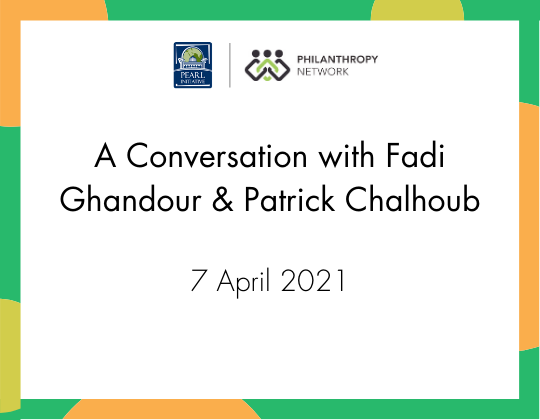There is no debate that two of the Gulf region’s most dynamic entrepreneurs, Fadi Ghandour and Patrick Chalhoub, helped pave the way for the new generation of MENA business leaders. Known for their cutting-edge ideas, both cite technology, innovation, and entrepreneurial spirit as being integral to their respective commercial success. Beyond business, those very same tools played an equally significant role in driving impact across their respective CSR and philanthropic endeavours.
Fadi and Patrick share the vision that technology, innovation, and an entrepreneurial approach to CSR and philanthropy can best enable sustainable development in the region. They prioritise localised initiatives that empower individuals and communities with the tools to surmount their own challenges in the near and long terms. With the SDG deadline looming and the COVID-19 pandemic continuing to impact the very fabric of society, this strategic approach to philanthropy has taken centre stage as a game changer for supporting communities to rise above the seemingly incessant challenges.
What we learnt:
- The private sector and the wider entrepreneurial community have a specific and important role to play outside their commercial role.
- Clients and other consumers are more cognisant than ever and are paying more attention to how the private sector is engaging with and serving its community.
- Organisations focused on social initiatives also now tend to be better at attracting young talent.
- The ability to give back effectively is not necessarily dependent on the size of the organisation; the intention and impact of the business matter more.
- It is most effective for organisations to pick key focus areas and drill down on those pillars to maximise impact, instead of getting spread too thin over a range of issues.
- Chalhoub Group revised their philanthropic and CSR strategy to have a special focus on education; which they believe has a trickle down effect on other parts of the community. The group also focused on engaging their employees in assisting with their social initiatives in order to build a corporate culture focused on impact, rather than being process orientated.
- The life cycle and sustainability of a business is heavily reliant on whether the society it is based in, is thriving. In the long-term, it is vital for a business to be responsible towards its community to allow businesses to succeed as well.
- It is important to move away from sustainability projects working as a bolt-on arm of a business and instead, to integrate it within the heart, operations, and strategy of the business itself.
- Creating a symbiotic relationship between the business and its giving heightens the impact that can be achieved.
- Contemporarily, cheque-writing has been frowned upon. However, Fadi Ghandour noted that it is a vital aspect of and democratises the wider ecosystem.
- Although management buy-in is necessary, it is also imperative to build a corporate culture that understands the organisation’s focus on social impact.
- The digital landscape has shifted and enabled organisations to scale their social-impact projects virtually to reach a large number of beneficiaries, which was especially pertinent to continue during the pandemic.
- Corporate organisations have a holistic obligation towards the betterment of society that goes beyond just job-creation.
- Patrick Chalhoub believes in de-regulating and not enforcing giving, but instead raising awareness about social initiatives so that it does not feel obligatory.


Phil Buchanan
Designation: President of CEP
Phil Buchanan, president of CEP, is a passionate advocate for the importance of philanthropy and the nonprofit sector and deeply committed to the cause of helping foundations and individual donors to maximize their impact. Hired in 2001 as the organization’s first chief executive, Phil has led the growth of CEP into the leading provider of data and insight on philanthropic effectiveness.
Phil is author of Giving Done Right: Effective Philanthropy and Making Every Dollar Count, published in 2019 by PublicAffairs and named the “Best Philanthropy Book of the Year” by Inside Philanthropy. He is co-host of a podcast, also called Giving Done Right, with CEP’s Grace Nicolette. Phil is a frequent blogger for the CEP Blog, author of op eds that have appeared in publications such as The Financial Times and The Boston Globe, and a frequent commentator on philanthropy in the media.
Phil is co-founder of YouthTruth, an initiative of CEP’s designed to harness student perceptions to help educators and funders accelerate improvements in K–12 schools and classrooms. In 2016, he was named the Nonprofit Times “influencer of the year” and he has been named nine times to that publication’s “Power and Influence Top 50” list. Phil serves on the boards of directors of Philanthropy Massachusetts and the National Council on Aging.
Phil lives in Concord, Massachusetts with his wife and their two daughters.
 What we learnt:
What we learnt:- The private sector and the wider entrepreneurial community have a specific and important role to play outside their commercial role.
- Clients and other consumers are more cognisant than ever and are paying more attention to how the private sector is engaging with and serving its community.
- Organisations focused on social initiatives also now tend to be better at attracting young talent.
- The ability to give back effectively is not necessarily dependent on the size of the organisation; the intention and impact of the business matter more.
- It is most effective for organisations to pick key focus areas and drill down on those pillars to maximise impact, instead of getting spread too thin over a range of issues.
- Chalhoub Group revised their philanthropic and CSR strategy to have a special focus on education; which they believe has a trickle down effect on other parts of the community. The group also focused on engaging their employees in assisting with their social initiatives in order to build a corporate culture focused on impact, rather than being process orientated.
- The life cycle and sustainability of a business is heavily reliant on whether the society it is based in, is thriving. In the long-term, it is vital for a business to be responsible towards its community to allow businesses to succeed as well.
- It is important to move away from sustainability projects working as a bolt-on arm of a business and instead, to integrate it within the heart, operations, and strategy of the business itself.
- Creating a symbiotic relationship between the business and its giving heightens the impact that can be achieved.
- Contemporarily, cheque-writing has been frowned upon. However, Fadi Ghandour noted that it is a vital aspect of and democratises the wider ecosystem.
- Although management buy-in is necessary, it is also imperative to build a corporate culture that understands the organisation’s focus on social impact.
- The digital landscape has shifted and enabled organisations to scale their social-impact projects virtually to reach a large number of beneficiaries, which was especially pertinent to continue during the pandemic.
- Corporate organisations have a holistic obligation towards the betterment of society that goes beyond just job-creation.
- Patrick Chalhoub believes in de-regulating and not enforcing giving, but instead raising awareness about social initiatives so that it does not feel obligatory.
